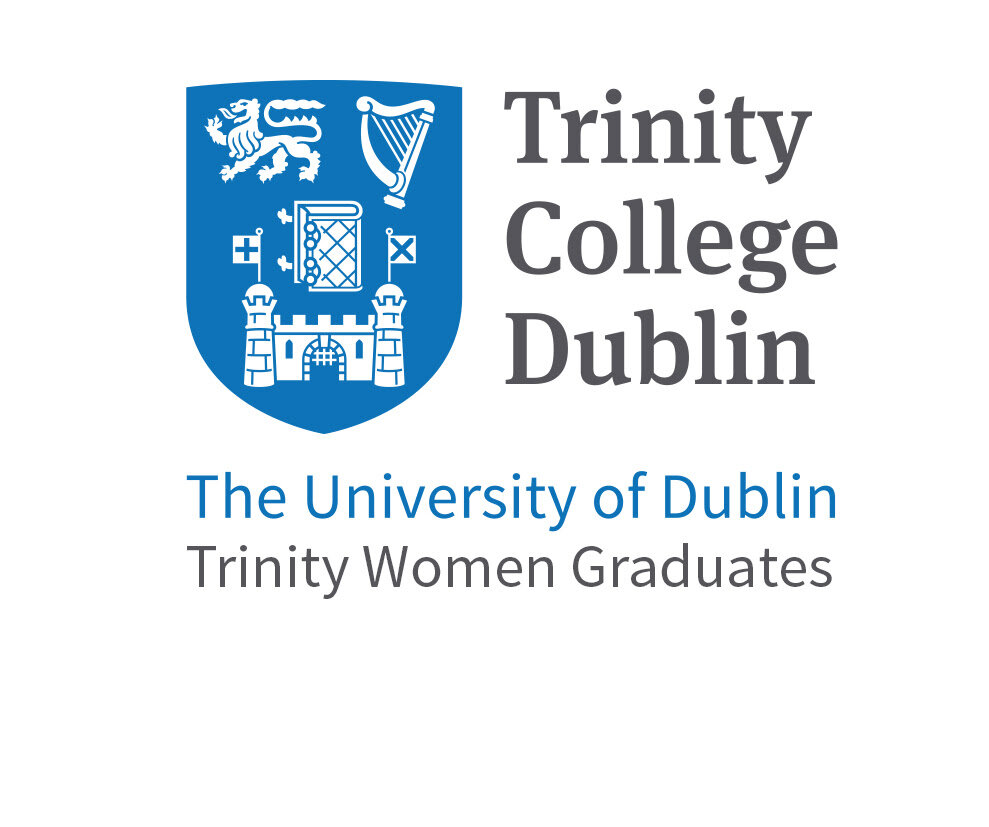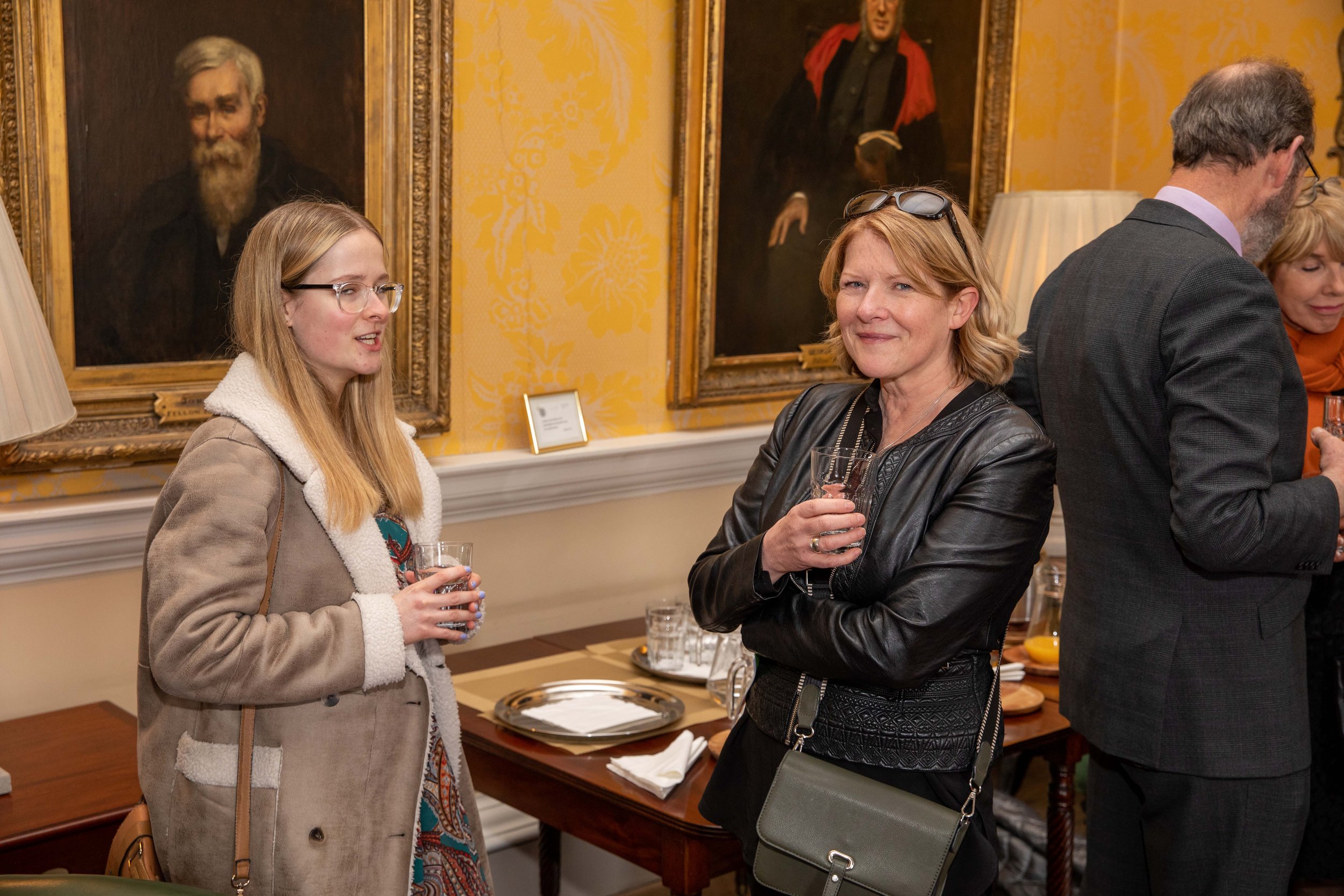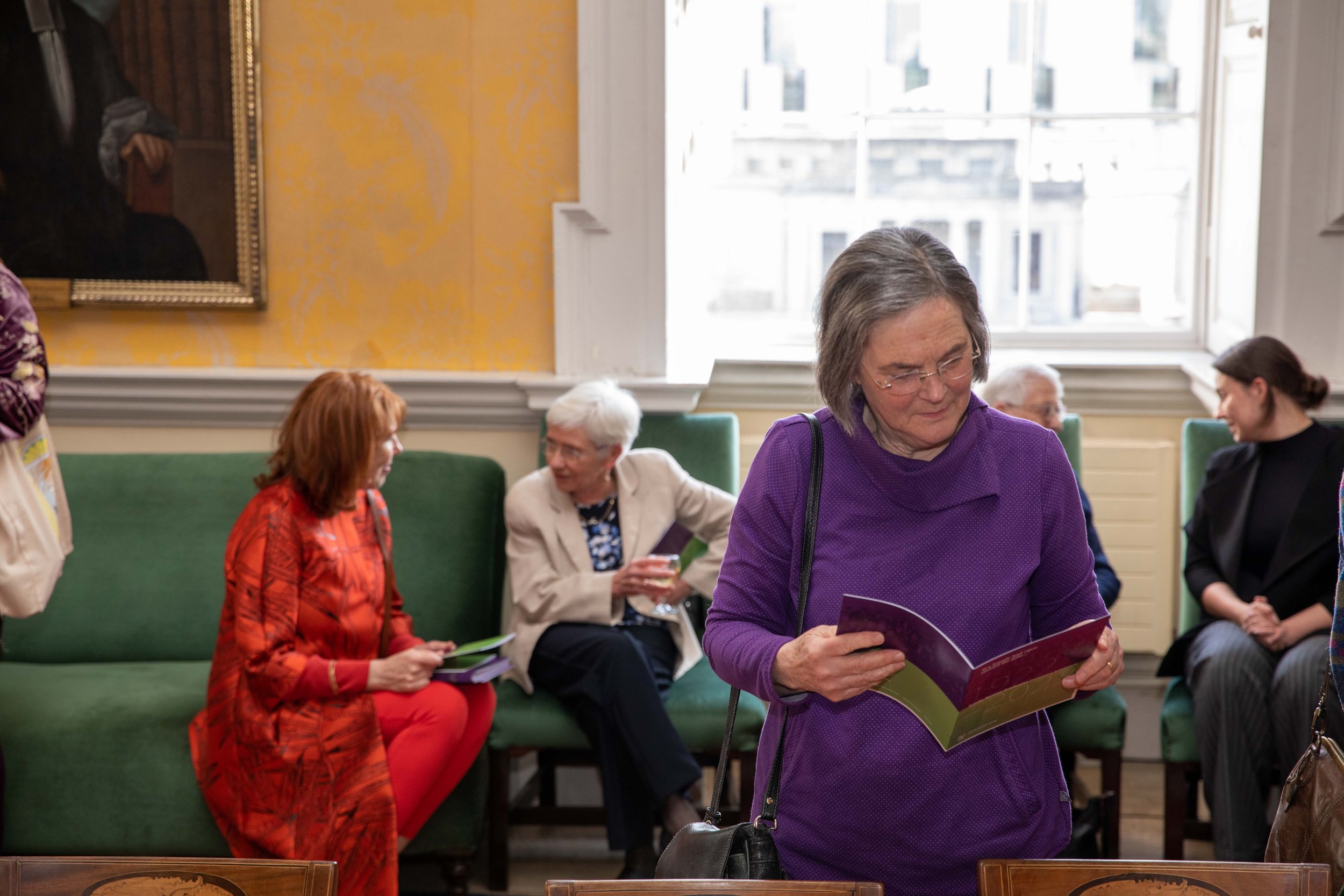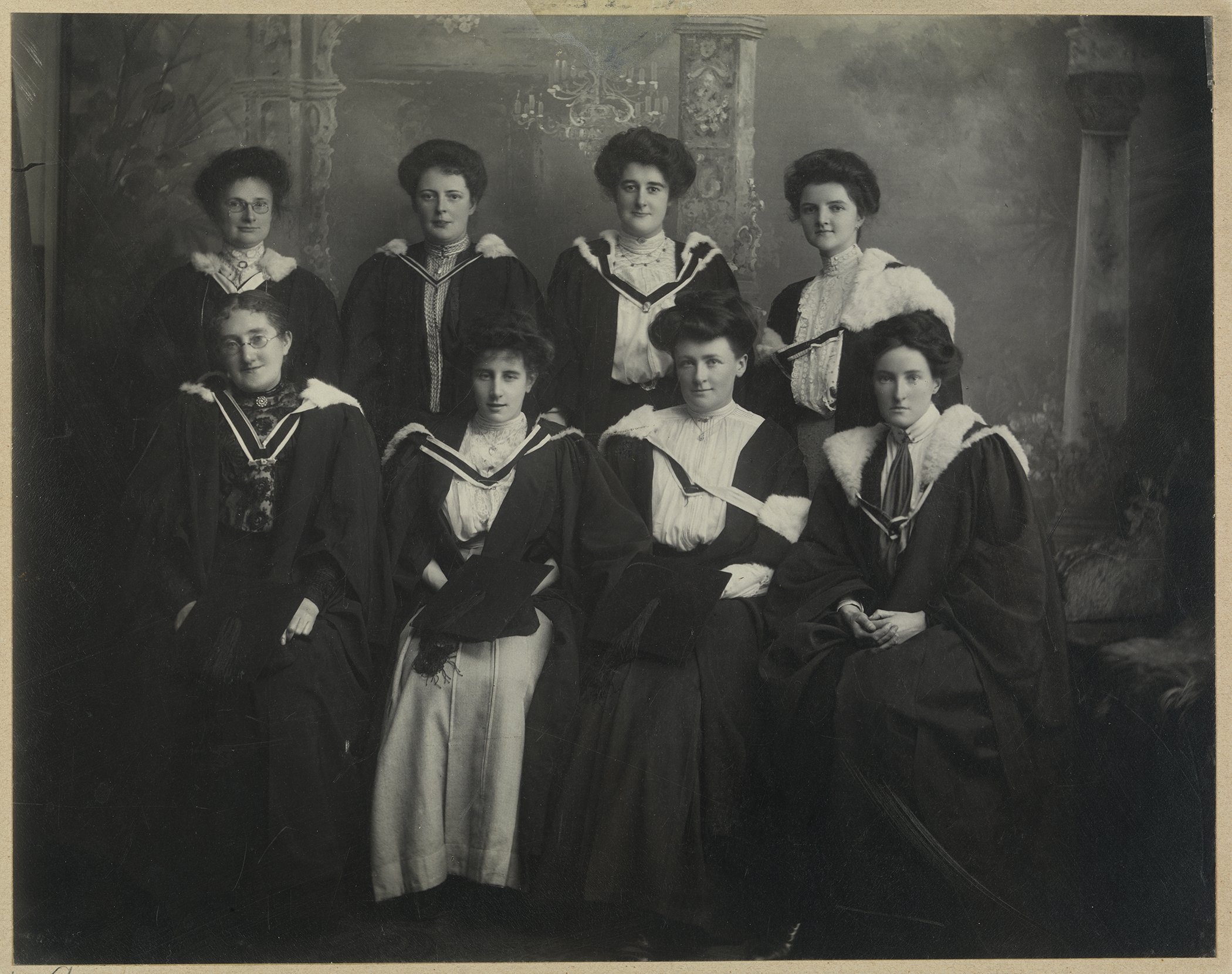
Celebrating 100 Years of Trinity Women Graduates Association
Archive Centenary Exhibition, April 2022
Celebrating 100 Years of Trinity Women Graduates Association
1922 - 2022
The Trinity Women Graduates Association (TWG), formerly DUWGA, is one of the oldest Associations in Trinity, founded in 1922 and celebrating its centenary in 2022.
For over three hundred years, Trinity College Dublin refused entry to women. In 1892, this bar was challenged head-on when ten thousand Irish women signed a petition demanding its abolition. Despite on-going opposition to the higher education of women, in 1904 Trinity College became the first of the historic universities of Ireland and Britain to admit women to degrees.
A century later, sixty per cent of the student body is female.
However, even in the 1960s, women students were still refused campus accommodation, had to leave Trinity by six o’clock and dine separately – all because their presence was judged to be ‘a danger to the men’.
The TWG Archive traces the long campaign for admission, the achievements of early women graduates and the struggle for equality by female students and staff. Lively memoirs and reminiscences of women graduates, collected by the TWG, combine with academic essays, to tell the fascinating story of one hundred years of women in Trinity and the influence of the women graduates on Trinity and Irish society.
Trinity opened its doors to female students in 1904. Unlike Oxford and Cambridge, where women had for some years been admitted to separate female colleges within the overall university, both men and women would be admitted to the University of Dublin's only college (Trinity) and it was felt there would be no rationale to restrict successful female students from graduating to become members of the university, like their male counterparts. In accordance with the long-standing formula of ad eundem mutual recognition that existed between Dublin, Oxford and Cambridge, the Provost of Trinity College proposed that eligible female Oxbridge course completers be granted Trinity degrees, as was the case for men.
"Steamboat ladies" was a nickname given to a number of female students at the women's colleges of the universities of Oxford and Cambridge who were awarded ad eundem University of Dublin degrees at Trinity College Dublin, between 1904 and 1907, at a time when their own universities refused to confer degrees upon women.The name comes from the means of transport commonly used by these women to travel to Dublin for this purpose.
1922 - 2022
The Hist was defeated by its own rhetoric, admitting women in 1969 when they had earlier declared ‘Not until man walks on the moon will a woman set foot here’.
The Board of Trinity College thought that only small numbers of women would take up the offer to graduate and that they would be Irish women who had studied in Oxford or Cambridge colleges. In fact, by 1907 Trinity had granted degrees to some 720 "steamboat ladies". All had passed examinations at Oxbridge that would have earned them a degree if they were male.The women were predominately students of Girton and Newnham Colleges Cambridge and Somerville College, Oxford.
Money deriving from the degree conferral fees that female graduates paid during this period were largely used to fund the purchase of Trinity Hall, an extramural hall of residence for female students, which opened in 1908.
The TWG Archive is a priceless collection of correspondence and documents written and preserved throughout the last 100 years by Trinity women graduates. This archive unlocks a story spanning 100 years, beginning with a quiet revolution, then resilience in times of discrimination, coping during the Emergency years and finally breaking the mould to bring about real change and equality for women.
The Archive uncovers gems of untold history such as how in 1923 Vida Barcroft shared her class notes with her friend and classmate Mr Samuel Beckett, which she believed helped him in no small part to win a scholarship to study in Paris – and the rest is history. It is incredible to learn that in the late 1930’s Joyce Craig, led a group demanding equal dining facilities with men. A complaint from 1967 in relation to Commons notes that ‘two non males did eat and sup in your august dining hall’ and suggests that more stringent methods be used to determine the gender of all guests to prevent further outbreaks of this nature.
The Hist was defeated by its own rhetoric, admitting women in 1969 when they had earlier declared ‘Not until man walks on the moon will a woman set foot here’. In 1961 the Hist had sent an invitation to Dr Henry at Sir Patrick Dunns Hospital to speak and when the reply came back saying Dr Mary Henry was pleased to accept, “a red faced Hist officer hastily dispatched a letter of apology withdrawing the invitation”.
Provost George Salmon, in 1904, declared “Over my dead body will women enter this College”. And they did. In the first decade, ten women were awarded gold medals for excellence in degree examinations. Yet women staff were not eligible for Fellowship, were not allowed membership of the Common Room nor permitted to dine at Commons, until 1968.
And a final gem to whet your appetite, the story of Leslie Greer, for whose role in the extraordinary work carried out in Bletchley Park, Britain’s second World War code-breaking and intelligence-analysing centre, was awarded an MBE in 2016 for her work.
This is a treasure trove of handwritten letters of hundreds of Trinity women graduates, reflecting the times these women lived in, yet highlighting the universal experiences that women and other marginalised groups can empathise and relate to.
This archive is a celebration of the achievements and hard fought victories of these women to be acknowledged as equal citizens, students, academics and graduates. The year 2022 will mark 100 years of the TWG and an opportunity to share this archive with a wider audience.
Archive Exhibition Centenary Events
Archive Centenary Exhibition
April 2022 - May 2022
The exhibition will be launched by the Provost, in the Long Room of the Old Library, in April 2022.
The Exhibition traces the long campaign for admission, the achievements of early women graduates and the struggle for equality by female students and staff, to tell the fascinating story of one hundred years of women in Trinity and the influence of the women graduates on Trinity and Irish society.
The Centenary Exhibition is on display in the Old Library and can be accessed via the Book of Kells exhibit; a Virtual Exhibition is also now available online.
A webinar, with a guided tour of the Virtual Exhibition by the Archivist, is planned for May 11th, 1-2pm.
We hope you will visit Trinity to enjoy the exhibition, or visit the Virtual Exhibition online.
Launch of TWG Centenary Exhibition by Provost Linda Doyle, April 27th 2022
Centenary Stories
Steamboat Ladies
Steamboat Ladies is the story of 700 female students from colleges in Oxford and Cambridge who travelled to Trinity College Dublin by Steamboat between 1904 -1907 to collect their degrees. They did this because their own universities refused to confer degrees upon women. These were pioneering women from the field of academia, science, and humanities and they went on to have careers that began to shape the newly emerging role of women in politics and society.
“When I became a fellow of Trinity in 1968, to mark this occasion, the then Principle of Newnham, Cambridge, Dame Ruth Cowen, gave me one of the Steamboat Ladies gowns, to mark this event. It was a plain black gown. It was a gift from Cambridge to me personally. I thought that was really moving that they wanted to mark the full accession of women to all stages in Trinity, in gratitude for what Trinity had done for them. These were very important women, in society, and in the world of learning, and it was extremely important that they should be recognised as such…”
Emeritus Professor Barbara Wright
Steamboat Ladies is produced by Patricia Baker and is a Curious Broadcast production funded by the Broadcasting Authority of Ireland with the television license fee.
Patricia’s background is the arts. Patricia studied sculpture and later went on to do an MA In Contemporary Art Practices. She has worked the arts and culture sector for over thirty years. In 2009 Patricia made her first radio documentary. She fell in love with the medium and has been learning the craft ever since.
The Launch of the TWG Centenary Exhibition, Trinity Week 2022
Launch in the Old Library, Trinity Week, 2022
The Provost and Lucy Corcoran, TWG President
Front L-R Aine Doyle, Lucy Corcoran, Teresa Trainor.
Back L_R Angie Mezzetti, Flor MacCarthy, Grace O’Malley, Marie-Thérèse Rainey, Sandra O’Connell (TWG Committee)
Tricia Golden, TWG Archive Treasurer, Paula Meehan Poet, HE Patricia O’Brien, Lucy Corcoran TWG President, Grace O’Malley TWG Archive Committee
Grace O’Malley, Fiona Ross, Provost Linda Doyle
The Librarian, Helen Shenton
Paula Meehan and Ambassador Patricia O’Brien
Archivist Ellen O’Flaherty, TWG Archive Comittee with Margaret
Elizabeth Goldthorpe with Susan Parkes
The Provost with Paula Meehan and Ambassador Patricia O’Brien
Three TWG Presidents - Deirdre Ahern, Grace O’Malley and Lucy Corcoran
Provost with Chancellor and former President of Ireland Mary McAleese
Eileen Pentz, former TWG President, Grace O’Malley, Colette Grant IrFUW, Nicola Carroll and Annette Durkan IrFUW
Jane Grimson, Elizabeth Mayes, Finola Revington
Angie Mezzetti TWG Committee, with Anne Brady
Grace O’Malley, Provost Linda Doyle, Jennifer Gill
In the Long Room of the Old Library; Valerie Mulvin, Joanne Kenney, TWG Vice-President
Chancellor Mary McAleese with Lucy Corcoran, TWG President
Professor Jane Grimson
Elizabeth Oldham
Veronica Campbell, former TWG President and TWG Archive Committee
Ambassador Patricia O’Brien with Tricia Golden and Lorna Jennings, TWG Archive Committee
On left Melissa Webb with her daughter Emma and husband Michael
Lorna Jennings, former TWG President and TWG Archive Committee
TWG President Lucy Corcoran with Helen Curtain and Mary Wilson from UCC, Grace O’Malley and Tricia Golden, TWG Archive Committee.
Kristina Odlum, former TWG President with Frances Patton President IrFUW
Ambassador O’Brien chatting with Corinna Lonergan, Catherine O’Brien, Helen Curtain, Mary Wilson
Marie-Thérèse Rainey (TWG Committee)
Jane Grimson perusing the exhibition catalogue, with Grace O’Malley and Elizabeth Oldham in background.
Ambassador Patricia O’Brien chatting with Corinna Lonergan TCD, Catherine O’Brien UCC
Tricia Golden, TWG Archive Committee, with Ambassador Patricia O’Brien
Teresa Trainor, Former TWG Treasurer
HE Patricia O’Brien, Chancellor Mary McAleese, TWG President Lucy Corcoran, TWG Archive Committee Grace O’Malley
Aine Doyle (TWG Archive Committee), Paula Meehan Poet, Flor MacCarthy (TWG Committee)
Former TWG Presidents: Elizabeth Mayes, Kristina Odlum, Eileen Pentz, Veronica Campbell
Enid K Thrift, 1925 Graduate in Botany
Carolyn Burns sent us this fascinating story of her Granny, Enid K Thrift, who graduated with a Gold Medal in Natural Science in 1925 and Carolyn's daughter Rachel, who Graduated almost a hundred years later in 2021, with a gold medal in Mathematics. Enid's father was Provost at the time of her Graduation (Provost Thrift).
Two exceptional women indeed!
“If a female had once passed the gate”: Trinity Women Graduates Archive
Trinity Women Graduates is delighted to announce the start of the Trinity Women Graduates Archive Project. This project marks the centenary of the Trinity Women Graduates Association (TWG) in 2022. The records of the association are currently being catalogued as part of a Virtual Trinity Library project with the Library of Trinity College Dublin to make them accessible to researchers and students.










































